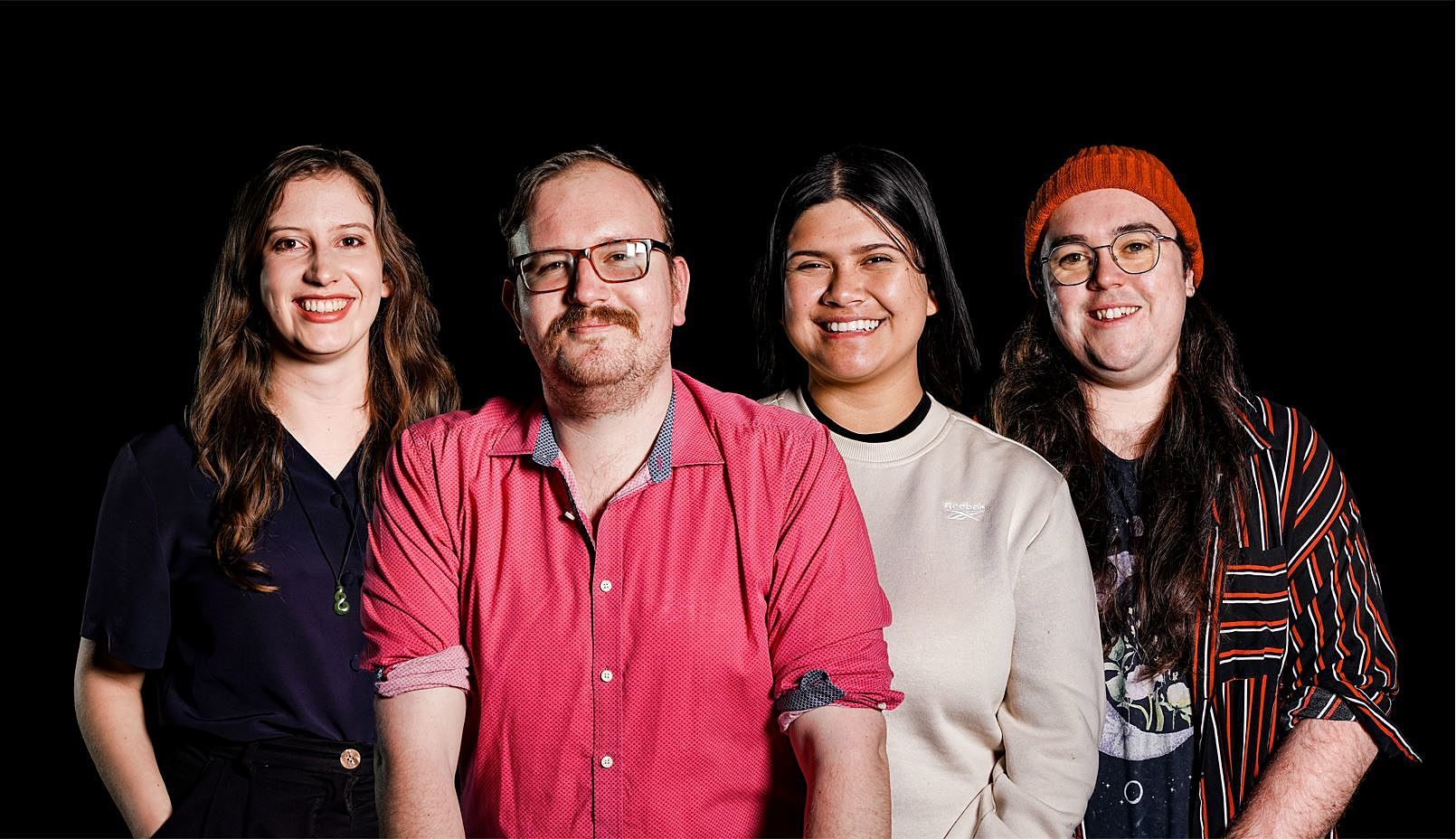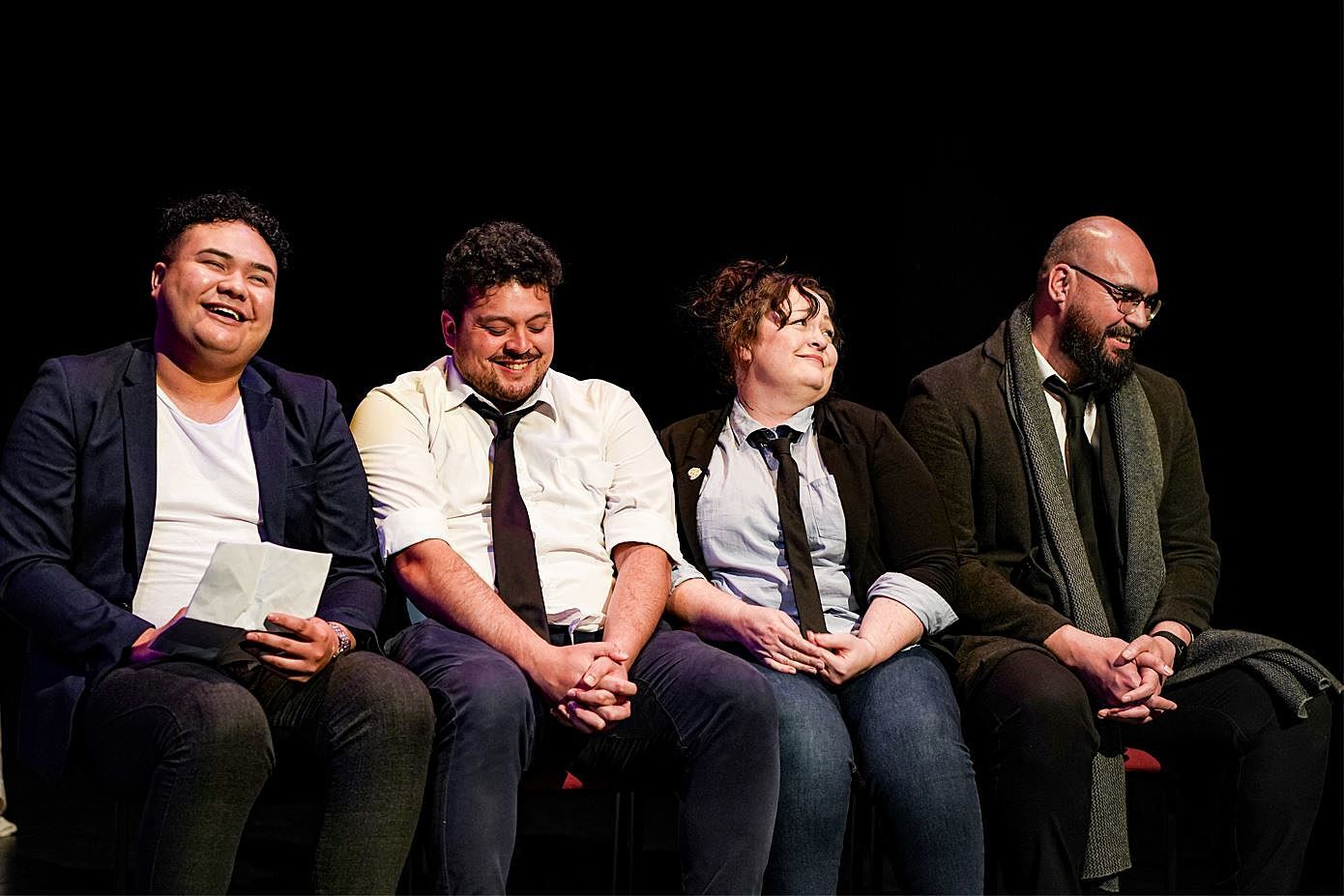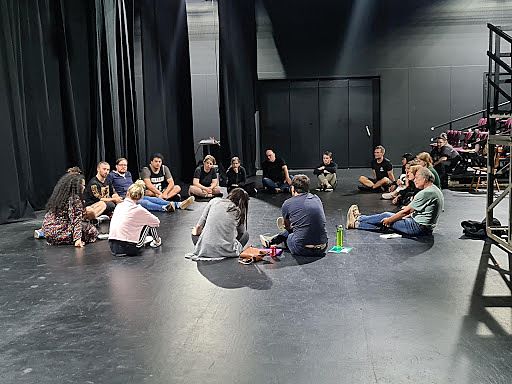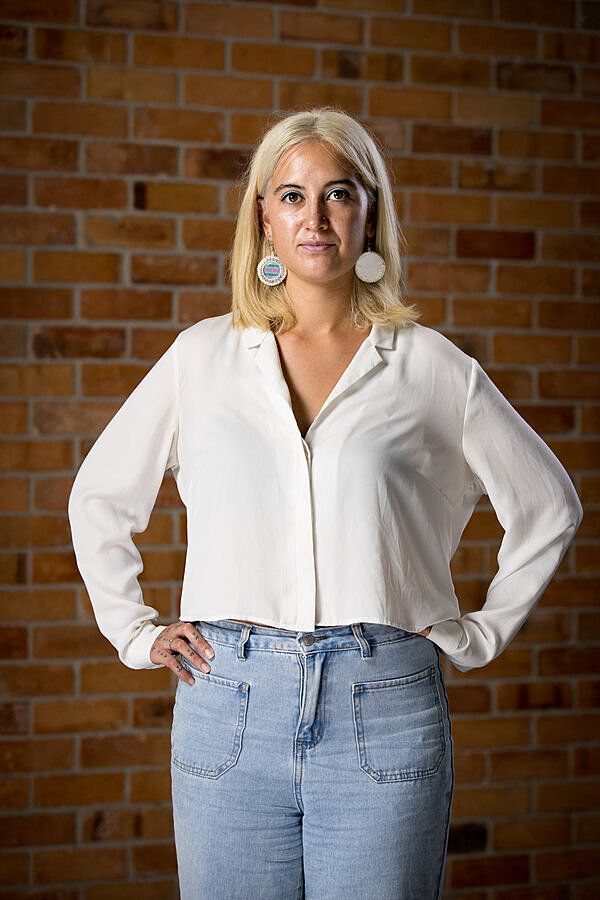Reka As: A Roundtable with Boil Up
Faith Wilson has a mean as kōrero with emerging Kirikiriroa theatre makers from the development programme Boil Up, run by The Meteor Theatre.
When you think of theatre hubs in Aotearoa, Kirikiriroa is probably not the first city that comes to mind. Deborah Nudds, General Manager at The Meteor Theatre, wants to change that. With her team at The Meteor, theatre development programme Boil Up was imagined. Local and emerging playwrights and directors developed an original play and were mentored over several months by some of the most exciting theatre practitioners in Aotearoa. The end result is a play that’s ready for the stage, and new audiences.
I sat down with Deborah and Boil Up participants Hinerangimarie Berryman, Conor Maxwell, James Smith and Lily Empson to hear the lowdown on the plays they are working on and their experiences with Boil Up, and to get some insight into what got the pot boiling.
Deborah Nudds: Boil Up is based at The Meteor Theatre – we’re an accessible and affordable space, aiming to programme at least 50 percent of local content annually – and we easily achieve that. We’ve got a lot of creative people in our community, but don’t have a well-structured professional framework in place for people to naturally develop their creativity. The idea for Boil Up is to offer mentorship and time to work with outside practitioners who can bring new perspectives into our spaces, through creative development, creation and production design, so we can learn to tell our stories in more innovative and challenging ways.
Kirikiriroa has its new Waikato Regional Theatre opening in 2024. We want to start helping our creatives and developing our stories so when that stage is built, it’s reflective of us. We can have works that can be on that scale. I see The Meteor as a little coral reef for these new works to grow, and for these practitioners to grow their experience.
I’m so here for this. I love the idea of the coral reef. It makes my heart sing, knowing that theatre practitioners in my home city have an opportunity to test the waters, learn from other creators in the scene and spend time developing their works in a creative and exploratory environment. In a kōrero over Zoom, I ask each of the creators to tell me about their experience with Boil Up.
It makes my heart sing, knowing that theatre practitioners in my home city have an opportunity to test the waters
Lily Empson: Elsie is the first show I’ve created where it’s been my idea that I’ve wanted to see out. It was useful to take part in Boil Up because I could get the extra support I needed. To have my ideas challenged and extended with people who work in the industry helped grow my personal creative practice and extend myself further. Having the support of local mentors to touch base with regularly has been valuable in moving my work forward.
Conor Maxwell: I had the opposite beginning to Lily. Juniorisn’t my first show, it’s my second one this year. I came into Boil Up with a lot of experience, but not this exact experience. I’ve only ever directed original works, either my own or somebody’s I know. When you’re putting on an original show it’s like being in an echo chamber because you don’t know whether it’s good or not. Everyone in the cast is telling you it’s good, but they would say that ‘cos they’re in the play! So it’s important to have people from the outside critiquing, editing and building it as you go. I came into this with a pretty good draft and immediately realised it wasn’t as good as I had thought. Three or four drafts later, I had a solid show to put on stage. It was cool preparing for a season and knowing it was good before the audience came in. Because it had gone through that development, I knew it would be strong at the other end.
Junior rehearsal. Photo: Benjamin Wilson
James Smith: For me, the biggest thing was the connections to professionals. In Kirikiriroa you have a small group you connect with most of the time. Boil Up was an opportunity to go out and show professionals and ask what they think. At the first workshop, I walked in and saw Anders Falstie-Jensen, now the director for my show wish i was there. We talked about it for a bit, we played with it. He said my idea “is really weird and I like it.” It grew, and by the end of that workshop weekend I almost had a full script. It’s cool to feel supported by professionals and feel that they actually like my stuff.
Hinerangimarie Berryman: Like Lily, I’ve only ever been in other people's works; I've never made my own. Benny Marama [Experience Manager at The Meteor] told me about Boil Up and to check it out. I really wanted to get a story that’s relatable to Māori out there, but in a positive light – a lot of the stuff you see is negative. Those stories tell the truth about Māori society, but I wonder why they’re the only ones that are being produced. Why are there none that talk about the success of Māori?
I went into Boil Up with that idea, then freaked out ‘cos everyone had draft scripts and I had an idea and was like… here you go, take this! And they did. Using the seed analogy, that idea grew into a sapling and then a tree, a play called Atāmira. Being the person who planted the seed, I’m proud to be part of Boil Up, to share this idea with other people.
I want to hear more about the plays they’ve all been working on
I want to hear more about the plays they’ve all been working on. I wonder what ideas and stories served as inspiration for each of their plays, as their creative seeds, in Hinerangimarie’s words.
LE: Elsie is about my nana of the same name. She died on New Year’s Eve 2020, at 98 years old. She had this massive life and I wanted to pay tribute to it. Boil Up project applications opened in January, and she was on my mind. From wanting to retell her life, it’s merged and morphed into this idea of trying to remember people through sharing memories and stories with other people. I knew I wanted to create a piece of theatre and be part of the programme, and it grew from there.
CM: One of the ideas I’ve been working on is a play where all the characters are horrible, garbage people, and getting the audience to side with bad people who are decidedly less bad than some of the other characters. I love the genre, so I combined that with the idea of a murder mystery. I wanted to challenge myself to write a murder mystery that’s difficult to solve, that has layers. And to get the audience to fall for characters that suck.
JS: My play was written from the perspective of coming to understand my gender identity. The story started off as someone from Earth going to Mars. Then it changed into someone coming from Mars to Earth. It became a two-person, then a three-person play. Now it’s back to one person flying through the solar system, trying to find a home on one of the planets. Initially, I was playing on the metaphor of male identity being connected to Mars. The character rejects the Martian lifestyle and wants to find something else out there. Then there’s the connection between Venus and femininity, and Earth is the middle ground. Spoiler – the character goes back to Earth, a planet that has been dead for centuries after humanity spread through the solar system and rejected it. It went from being explicitly about gender to finding yourself and your identity and the place you want to belong. It’s become more universal.
I wonder what ideas and stories served as inspiration for each of their plays, as their creative seeds, in Hinerangimarie’s words
HB: Atāmira is a lot of things! Someone said it was a coming-of-age story. It’s a one-person play, but I have two characters, and I play both of them – Ata, the daughter, and Hone, the father. Kind of like the typical ‘parent is trying to do what's best for the child, but child rebels’ story. It does have a coming-of-age aspect, but the further we get into the story, the more I touch on Māori issues, specifically systemic racism. Hints of it show up in the later stages. It uses theatre as a vehicle to drive these messages out there. The play starts off as very light, and I use aspects of kapa haka to bring it to another level – it's a musical and the songs are quite ‘Disney’.
This play is founded on a Māori perspective and Māori struggles, but also brings forth the idea that Māori are capable, that we defy stereotypes, and are actually reliable, talented and smart people. The character Hone in the play only speaks te reo – I speak te reo Māori and I’m fluent. But whether you’re Māori or not, there are a lot of things in the story people can relate to. It’s translatable to all cultures and not just exclusive to Māori, ‘cos I want to include everyone!
Hani Berryman
Rolling with the idea of Boil Up as a way to provide professional opportunities for Kirikiriroa theatre, I’m keen to hear what the group thinks are some of the challenges that theatre in Kirikiriroa faces.
CM: Kirikiriroa is really cool, in the sense that we don’t have a professional theatre company but we have places like The Meteor that are accessible to anyone that wants to give it a go. The downside to that is they vary in quality. I’ve been involved in shows that have been low budget in a bad way, and what’s been produced hasn’t been the most polished. When you have a lot of shows like that, it’s hard to attract audiences outside of Kirikiriroa. It’s hard to attract people with influence. Professionals and scouters come here and want to know where the high-quality theatre is.
I think we have the potential to make high-quality theatre here. We have so many talented people, many of whom are in this programme, who can continue to do some great stuff and get it out there. When Cian [Parker] took off with Sorry for Your Loss, people were like where did that come from? But it was always going to happen in Kirikiriroa because we have so many talented people. How do we get noticed? How do we polish our theatre, so there’s more of a spotlight on what we do here?
I’m keen to hear what the group thinks are some of the challenges that theatre in Kirikiriroa faces
JS: It’s hard for someone like me, who wants to be a theatre professional, because of funding. The number of people going for it and the amount that’s there often means we can’t afford to support ourselves. It’s a big risk, going off and doing something on your own, because you have to think about the paycheck. It’s not going to change overnight, but Boil Up tells us, here’s a way to get your foot in the door.
HB: Coming from Te Wharekura o Rakaumanga, in Huntly, where Māori arts are pushed, I was curious and ventured off into theatre. But I think a problem in Kirikiriroa is that theatre isn’t known by most people. My partner is supportive of me doing it, but before I started he didn’t know we had theatre here. Boil Up opened that up for him and a lot of my friends. They didn’t know that I made this play – when they found out about it, they were so curious. I think Boil Up gets the message out there for those who may find an interest in it, from seeing their friends doing it or even seeing a poster of a show that really connects with them.
In Kirikiriroa, we find ourselves in a little microcosm where people leave to go to Tāmaki Makaurau or Te Whanganui-a-Tara
DN: In Kirikiriroa, we find ourselves in a little microcosm where people leave to go to Tāmaki Makaurau or Te Whanganui-a-Tara to continue their creative journeys. So our challenge is to have professional outlets and the structure to build an industry where people can stay and create their work and be seen in a national context.
I agree that audience knowledge of theatre and this type of art in our city makes it difficult to build an audience. We’re constantly doing that, and it’s slowly growing. But it is difficult, and Kirikiriroa audiences are notoriously slow to attend shows. We have a range of theatres here and each one plays its role. It will be interesting to see what the effect of having – to use that coral reef analogy – that big whale of the Waikato Regional Theatre opening will be for professional capacity building. It’s going to be an interesting time.
CM: My Boil Up show Junior managed to go on stage in September, and people I’ve been friends with for years, who don't usually go to my shows, came to Junior. It had a much wider reach. I wonder if this programme, and the suggestion that there was a bigger development and a more professional air, attracted those people. Generally, you see your friend doing theatre and you think – it can’t be that great! The Boil Up programme draws the crowds, and maybe I might keep some of those audience members around at my next show.
Scene from a Boil Up workshop in April. Photo: Benjamin Wilson
DN: The other intention of Boil Up is not just for these works to premiere at The Meteor, but to take the works wider. Covid-19 has played a big part in these shows being able to premiere or not. Lily’s show Elsie is going to premiere at Hamilton Gardens Arts Festival instead of The Meteor because it will work well. James’s might premier at Dunedin Fringe – who knows? The intention as a project isn’t just to present these works in a more polished or professional way but to find pathways for them to reach audiences in other spaces.
A big challenge to the growth of professionalism and the industry is having that cross-pollination with other places, seeing how others do things, and appealing to a completely different audience. We want to develop these local works and test the creators by taking them into other spaces and growing and bringing their knowledge back here.
It’s a wonderful idea, encouraging our theatre makers of Kirikiriroa onto wider scenes in Aotearoa
It’s a wonderful idea, encouraging our theatre makers of Kirikiriroa onto wider scenes in Aotearoa. This makes me wonder if there are any people or theatre groups that each of the creators would like to work with one day?
CM: One of my big inspirations is James Cain in Wellington, and Red Scare Theatre. I was at high school at the same time as James. He is killing it down in Wellington, and it shows that the funny, talented people we have in Kirikiriroa can take their talent somewhere else and make a killing out of it. I’d love to work with him and that company one day.
JS: One of the big ones for me is Trick of the Light Theatre. I’ve always been interested in weird tech stuff like they do, and we’re trying to implement some of those ideas into my show. I’ve really admired everything I've seen of theirs. It’s a really interesting and smart way of creating theatre, using technology and weird devices that you wouldn’t expect.
I’m inspired by the creators I spoke to... they’re all the ingredients for a beautiful Boil Up, each adding their own flavour and style
LE: It's inspiring to see people from here who have put on shows in Kirikiriroa – like James Cain and Cian Gardner – to then go off and develop their creativity in other places. That's inspiring. It shows we can do it too.
HB: I’ve recently been introduced to Māori theatre company Te Pou Theatre. I’d also be interested in working with Hawaiki Tū and the Māori choreographers there. I’m not a dancer, but the idea of adding in other ideas with kapa haka is really appealing to me. I'd be interested in starting up a company that adds theatrical performance to kapa haka.
After our Zoom ends, I feel elated. I’m happy because I have so much faith in the creativity of Kirikiriroa. There’s an amazing creative scene there, and Boil Up is a testament to that. I’m inspired by the creators I spoke to, by the zeal and energy they have for not only their work but for the communities they belong to. They’re all the ingredients for a beautiful Boil Up, each adding their own flavour and style. What are you waiting for – bring along the fry bread and line up for your serving.
The plays Junior by Conor Maxwell, Elsie by Lily Empson, Atāmira by Hinerangimarie Berryman and wish i was there by James Smith were all developed as part of the Boil Up programme. Due to Covid-19, only Junior has premiered at The Meteor. The other three will premiere in 2022.
The plays were created in generous development with mentors Anders Falstie-Jensen, Jonty Hendry, Cian Gardner, Mikey Sorensen, Mel Martin and Fiona Collins.
Feature image: Boil Up participants (L – R) Lily Empson, Conor Maxwell, Hinerangimarie Berryman and James Smith. Photo: Benjamin Wilson




